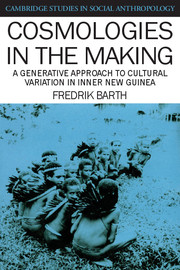Book contents
- Frontmatter
- Contents
- Foreword by Jack Goody
- Map: Major territories of the mountain Ok
- 1 The problem
- 2 An attempt at systematic comparison: descent and ideas of conception
- 3 The possible interrelations of sub-traditions: reading sequence from distribution
- 4 The context for events of change
- 5 The results of process – variations in connotation
- 6 Secret thoughts and shared understandings
- 7 The stepwise articulation of a vision
- 8 Experience and concept formation
- 9 The insights pursued by Ok thinkers
- 10 General and comparative perspectives
- 11 Some reflections on theory and method
- Bibliography
- Index
- Cambridge Studies in Social Anthropology
3 - The possible interrelations of sub-traditions: reading sequence from distribution
Published online by Cambridge University Press: 05 June 2012
- Frontmatter
- Contents
- Foreword by Jack Goody
- Map: Major territories of the mountain Ok
- 1 The problem
- 2 An attempt at systematic comparison: descent and ideas of conception
- 3 The possible interrelations of sub-traditions: reading sequence from distribution
- 4 The context for events of change
- 5 The results of process – variations in connotation
- 6 Secret thoughts and shared understandings
- 7 The stepwise articulation of a vision
- 8 Experience and concept formation
- 9 The insights pursued by Ok thinkers
- 10 General and comparative perspectives
- 11 Some reflections on theory and method
- Bibliography
- Index
- Cambridge Studies in Social Anthropology
Summary
Let us look again at this brief account of theories of conception and modes of descent among three Ok groups. The positions described look more like an argument than like status quo in three logically and functionally integrated systems. Each and all of the statements may be read as competing views on what are the facts of life. As such, they would be connected, not as logical inversions of each other but as confused disagreements within a broad tradition of knowledge. They would relate to social arrangements, yes, but perhaps as imperfectly realized strivings and visions of what life could or should be like, or as more or less shallow justifications of conventions or claims, or as statements about what appeared self-evident in the life context. Again we are back to the question of what ontological premises are entailed in the different methodological procedures. Is what goes on in these Ok temples and outside them better understood with the Durkheimians as the enactment of sociological tableaus, or is it closer to the truth to see them as episodes in the communication of and search for knowledge? Is their inherent order essentially limited to the ‘syntactic’ features uncovered by a Lévi-Straussian analysis, or is much and rich texture composed of systematic relations of a ‘semantic’, or an interactional, character?
- Type
- Chapter
- Information
- Cosmologies in the MakingA Generative Approach to Cultural Variation in Inner New Guinea, pp. 18 - 23Publisher: Cambridge University PressPrint publication year: 1987



